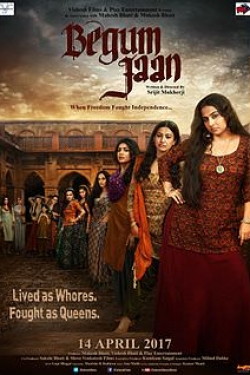-
Average.
Best : Acting
Worst : over melodrama.
5May 17, 17 -
Begum Jaan is a film by Srijit Mukherji, which is a remake of his own Bengali film Rajkahini (2015). The film delves into one of the darkest phase of partition of our country. The film does mention the tragedies which happened on either sides of the border. Radcliffe Line is to be erected as the boundary between the newly formed nations of India and Pakistan. The officials face a challenge when they find a brothel which needs to be demolished to draw this boundary. Begum Jaan takes us through the journey of those 11 women and 2 men, the inhabitants of the brothel and the fights they put up for their rights to live in their house. Rajkahini is certainly more intense in comparison to Begum Jaan, but this film can’t be just ignored or written off.
The film begins with the narrative of Amitabh Bachchan. The opening scene in this Hindi version is different in comparison to that of Bengali version. When a scene from Manto’s book of gang rape of a girl during partition times form the opening scene of Rajkahini, eve teasing and efforts to molest a girl in a bus in the year 2016, decades after independence, becomes the opening scene of Begum Jaan. Is this to tell the audience that years have gone by, certain things still remain the same - women becoming the victim of men’s lust. Begum Jaan does focus on women’s fight against many elements of our society: patriarchal system, the social stigma attached with sex workers, the hypocritical men and their double standards, the right to live, concepts of secularism etc. With the opening and closing scene of Begum Jaan, Srijit does talk about hard-hitting reality that even after decades of partition and independence, the fight against social injustice is not over. Begum Jaan does force us to question and rethink about our past as well as present.
Begum Jaan (Vidya Balan) is the owner of brothel, which has 13 inhabitants – 11 women and 2 men. Salim (Sumit Nijhawan) and Sujit (Pitobash Tripathy) are the two men in the brothel, Begum’s bodyguard and caretaker respectively. Amma (Ila Arun) is the senior most person in the brothel, who keeps sharing stories of empowered females to Laadli (Gracy Goswai) who created history and left their mark in the world viz. Rani Lakhsmibai, Meera, Raziya Sultan, Rani Padmavati etc. It does become part of plot development. Rest of the inhabitants are Rubina (Gauhar Khan), Gulabo (Pallavi Sharda), Jameela (Priyanka Setia), Amba (Ridheema Tiwary), Maina (Flora Saini), Lata (Raviza Chauahan), Rani (Poonam Rajput), Mishti aka Indrani Chakraborty (Shabnam). Master and Party worker (Vivek Mushran) is a regular visitor to brothel and keeps showering them with gifts. These women are all victims of abuse, violence, rape and these trauma become the connecting thread amongst them. All they have is their togetherness. Freedom means nothing for Begum Jaan.
The officials chosen for execution of border construction from either sides are Iliyas (Rajit Kapoor) and Harshvardhan (Ashish Vidyarthy). Through their characters, many intricate facts are conveyed, be it the relationship getting sour between childhood friends, plight / ordeal of people on either sides of the border etc. There are shots where only half of their faces are shown on screen – a metaphor of aftermath of partition, how incomplete people might have felt losing their possessions, family in spite of freedom being restored.
Other characters Raja Ji (Naseerudin Shah), Inspector Shyam (Rajesh Sharma) and Kabir (Chunky Pandey) become important part of the film.
Feisty Begum Jaan and other inhabitants of the brothel are not ready to pay heed to notices issued to her to vacate ‘Kotha’. They are very loud and clear that it is their house. How they all put up brave fight forms the rest of the story.
There are many dialogues in the film which hits one hard.
Srijit through his film Begum Jaan does talk about hard-hitting reality that even after decades of partition and independence, the fight against social injustice is not over. Rajkahini, the original version, is certainly more intense in comparison to Begum Jaan, but this film can’t be just ignored or written off.
3April 24, 17













